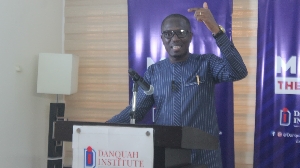- Home - News
- TWI News | TV
- Polls
- Year In Review
- News Archive
- Crime & Punishment
- Politics
- Regional
- Editorial
- Health
- Ghanaians Abroad
- Tabloid
- Africa
- Religion
- Election 2020
- Coronavirus
- News Videos | TV
- Photo Archives
- News Headlines
- Press Release
General News of Friday, 17 June 2011
Source: --
Energy Minister Foils Hijack
National Gas Infrastructure Dev’t Project
By J. Ato Kobbie, Managing Editor
An attempt by some faceless operatives to hijack the role of the Minister of Energy, Dr. Joe Oteng-Adjei in the national gas Infrastructure Project implementation, by going behind him to strike a deal that would have effectively handed over the project to a consortium of European international oil companies, has been thwarted by the soft-spoken minister.
The Business Analyst intelligence gathered that the plot to ‘hijack’ the project from the minister, appeared to have been well choreographed, as the peak of the scheme occurred at a time the Minister was away in Trinidad and Tobago, holding discussions with his counterparts in that country regarding the gas infrastructure project.
The schemers had tailor-guided the process with efficiency to the extent that the signing ceremony for that secret contract, which would have granted these companies the exclusive rights to develop gas infrastructure for processing and transporting gas to be produced from Ghana’s Western Basin, was fixed to coincide with his return from abroad. But for his vigilance, and, hitherto unknown steel nature, backed by the President, Dr. Oteng-Adjei, who was ambushed, would have been hoodwinked into signing the secret contract, disguised as a memorandum of understanding (MOU) at the Castle. The consortium, comprising IOCs that have made recent discoveries offshore Ghana, had arranged a signing ceremony for last Friday, June 10, 2011 at the Castle, even though they had had no prior discussions with the Ministry of Energy, which has direct oversight, about this project.
The schemers, using influential lobbyists and some “Castle Officials” to promote their agenda, hatched the plot on the minister’s blind side, as he was said to have learned about the contract he was to sign upon his return from the trip abroad the day before the proposed signing date. The Ghana National Petroleum Corporation (GNPC) was also kept in the dark about the activities of its “partners” and was not invited to the signing ceremony. The Minister of Energy, was, however, reported to have stood his ground and blocked the deal to the embarrassment of the global chief executives of the two companies, who had flown into Accra for the proposed signing ceremony at the Castle.
They were however, forced to retreat when President John Evans Atta Mills backed the Minister and repudiated the officials that had represented themselves as having authority to negotiate on behalf of Government.
The Minister is said to have been so incensed by the deal that he offered to tender his resignation rather than sign.
The contract, if signed would have undermined national control over gas development and industrialisation and would have placed Ghana’s gas sector under the effective control of the two European giants, who could then use their combined upstream and downstream position to make super profits and dictate development policy to the people of Ghana.
The deal would also have undermined Ghana’s strategy for delivering basic infrastructure to commercialise the Jubilee gas by July 2012 as promised by the Chairman of the National Gas Development Task Force Dr. Kwesi Botchway.
The Business Analyst intelligence gathered that Ministry officials are frustrated with the number of power brokers scheming to usurp its management of the national Gas Infrastructure Project. A team of energy sector experts set up by the Ministry of Energy concluded in April that the National Gas Development Task Force recommendations would not provide the optimum utilisation of Jubilee gas and in any case are unworkable.
The National Gas Company (NGC) of Trinidad and Tobago, who at the Castle’s invitation sent down a team to design and implement the project with GNPC, are yet to receive a response to the joint proposals submitted in March 2011.
The invitation was to set in motion a process towards averting or minimizing gas flaring in Ghana’s oil production, which required that the project commenced immediately, since gas re-injection into the Jubilee reservoir, was to start in April.
The National Gas Development Task Force, which had been set up by the President in September 2010, with a three-month mandate, was however, soon to present its report six months down the line, with recommendations that effectively halted the process initiated at the instance of the president. The Ministry is said to prefer the proposals put forward jointly by the National Gas Company of Trinidad and Tobago and GNPC.
Government is however implementing Dr. Botchway’s recommendations to create a Ghana National Gas Company to implement the project, using funds to be sourced from the China Development Bank and staff to be seconded from various state-owned oil and gas agencies.
It is not clear yet when the funding could be accessed. However, the GNPC-NGC strategy proposed would initially have been funded by NGC. Tullow Ghana Limited, Operator of the Jubilee Field can only continue to inject gas back into the jubilee reservoir for another 16 months, after which flaring must resume. This can lead to a cut back in crude oil production and cost Ghana billions of Dollars for every month that flaring continues.
The deal that was foiled by the Minister, apart from giving control of the country’s critical gas infrastructure to the foreign companies would have complicated the Ministry’s relations with all the upstream companies, who would suddenly have found that they are dependent upon infrastructure owned by one of their competitors for access to Ghana’s gas markets. Incidentally, Tullow, as Operator of the Jubilee Field, had offered to develop infrastructure to commercialise Jubilee gas but was turned down by Government on the grounds that it preferred GNPC as Ghana’s national oil company to lead the project.
The GNPC insists they have the best institutional capacity as well as the statutory mandate to implement the gas infrastructure project on behalf of Ghanaians and are said to be aggrieved that Government has ignored their recommendations in favour of a “fanciful” Task Force recommendations that cannot possibly be implemented and that will lead to substantial financial losses to the State.
GNPC has already layed a 14-kilometre deepwater pipeline from the floating production, storage and offloading (FPSO) Kwame Nkrumah MV 21, with the remaining 36-kilometre stretch to complete the 50-kilometre distance from the vessel to Bonyere in the Domunyili area earmarked for the project pending. The Business Analyst investigations continue to determine which Government individuals were responsible for this obviously unpatriotic deal; whether they were motivated by greed or by a thirst for power, or what disciplinary action the Government will take against them. j.atokobbie@yahoo.com










